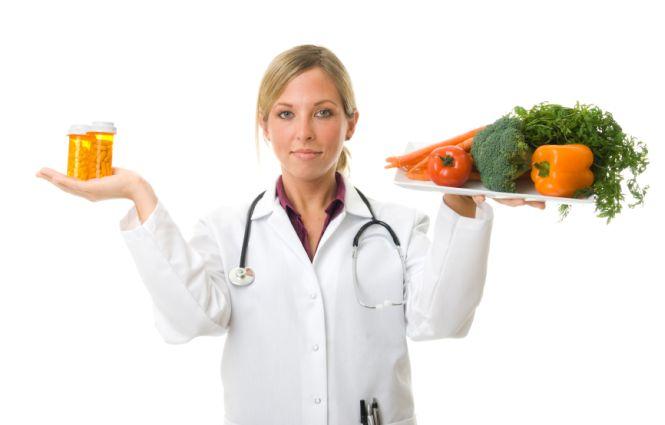Diet in food poisoning guidelines:
Food poisoning is an inflammation of the gastrointestinal tract that occurs in the form of acute gastro-intestinal catarrh. The cause of food poisoning are usually contained in food bacteria or viruses. More often they occur in warm seasons, when the microorganisms are beneficial to their development conditions. Bacterial food poisoning cause toxins produced during growth of microorganisms. The incubation period of the disease is variable and depends on the type of bacteria. Usually, nausea, vomiting, abdominal pain, diarrhea, sometimes accompanied by fever.
|
|
|
Symptoms of food poisoning usually subside after a few days. There are poisoning, such as botulism, which require immediate medical care. Poisoning is caused by a toxin produced during anaerobic growth of Clostridium botulinum, which occurs due to consumption of infected meat, canned vegetable and fish. In addition to the symptoms of this disease among with gastro-intestinal catarrh there is a paralysis of facial muscles, which gives the mask-face image. In addition, the patient sees double, has wide eyes, there is often one-sided ptosis, hoarseness and even aphonia. These symptoms may include: difficulty swallowing, constipation, urinary retention due to damage to the nervous system. That is why botulism is so dangerous and requires treatment in hospital. Medical intervention is also necessary in acute salmonella poisoning. The most common form occurs in approximately 80% of cases are acute gastroenteritis, characterized by symptoms such as nausea, vomiting, abdominal pain, diarrhea, and sometimes there is fever and headache. Sometimes the disease takes a more violent form, depending on the type of symptoms form called: cholera, typhoid, flu-like illness, which often require hospital treatment. Salmonella is present mainly in the fresh and undercooked poultry and raw eggs. Therefore, the poultry should be prepared with other knives and cutting boards than other products.
Treatment of common poisonings
In the case of ordinary bacterial infections, if we can not contact a physician, treatment is primarily symptomatic and application procedure of sparing diet. The basic element of therapy is to compensate loss of fluids, because it can lead to dehydration. Vomiting and diarrhea also lead to large losses of electrolytes, especially sodium, potassium and chlorine. Electrolyte deficiency superimposed on dehydration worsen the patient's condition and may cause problems especially cardiovascular. Drinking Coca-Cola and other caffeinated beverages is not recommended in dealing with food poisoning.
The main principles of the diet
? The use of supplements in the food poisoning is a necessity. For 1-2 days in acute gastritis foods are usually not given in all. During fasting, must not under any circumstances forget about consuming adequate amounts of fluids to prevent dehydration. It is low-sugar drinks at room temperature, such as tea, chamomile, peppermint brew, still water. During the day you should drink about 2 liters of fluid. It is better to drink frequently but in small quantities.
? In case of persistent vomiting can drink larger quantities to provoke vomiting again and clean the stomach of unwanted food.
? The introduction of food must be gradual. First, slowly expanding a diet of gruel, which should be made with rice or semolina boiled in water (not milk!) with salt. If the introduction of such foods do not cause any adverse effects, further expanding the diet of crackers. Then we can spice up a menu, including soft-boiled egg for example, boiled potatoes, boiled meat.
? Choose lean meats and delicate species, such as veal, lean poultry, e.g. chicken or turkey without skin.
? Fried foods contain a large amount of fat is excluded.
? In the initial period should not eat fruits and vegetables, especially raw, and sweet desserts. In a further extension of the menu you can specify a banana or fruit high in pectin, such as baked apple, slowly going to the usual diet.
? Over the longer term, however, despite the improvements achieved, and even a full recovery, avoid using canned food, pickles, smoked meats and fish, vegetables, legumes, cruciferous vegetables, alcohol and spicy foods.
If diet alone does not produce favorable results, it is essential to seek medical advice. Any type of medication should be under the supervision of a specialist.
To prevent food poisoning, you should:
1. Wash hands before contact with any food product.
2. Check expiration dates on the packages included.
3. Poultry and fish Cutting boards should be thoroughly cleaned and not used for other purposes.
4. Do not reheat cooked food more than once.
5. Keep perishable products in cold storage.
6. Avoid the summer food containing raw eggs.
7. The best is to thaw products in the refrigerator, while ensuring that leaks from thawing meat does not enter the other foodstuffs.
8. Avoid drinking unboiled tap water..
9. Thoroughly wash fruits and vegetables before consumption.
10. Once thawed foods must not be refrozen.
Example - diet in ford poisoning:
Breakfast: rice gruel on the water, tea
Lunch: tea with chamomile, rusks
Dinner: porridge with semolina, biscuits, tea
Snack: Tea with Chamomile, rusks
Supper: rice porridge, tea













